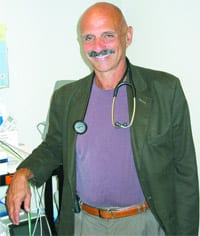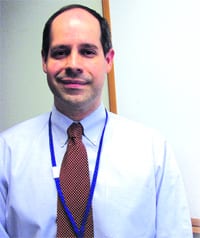Dr. Marc Schweiger says heart attack patient do better when they’re treated in catheterization labs, as long as they’re brought to the lab quick enough.
When it comes to saving the lives of heart attack victims, time is everything. Now Baystate Medical Center has received national recognition for the way it saves those precious seconds.
The Premier Healthcare Alliance — an organization of 1,500 hospitals dedicated to improving health care quality, patient safety, and hospital efficiency — recently recognized Baystate with its 2006 Premier Award for Quality for the hospital’s care of heart attack patients.
The award reflects not only Baystate’s mortality rate for heart attack victims — one of the lowest in the nation — but also for the efficient process in place to get those patients the often life-saving treatment they need as quickly as possible.
“We report data on our care of heart attack patients, and that is compared with all the hospitals in the country,” said Dr. Evan Benjamin, Baystate’s vice president of Healthcare Quality. “Baystate received this award for achieving very high quality and very low mortality for patients with heart attacks.”
The hospital has done so with a state-of-the-art approach to battling heart attacks that requires more than just cardiologists to succeed.
A Premier Service
Dr. Marc J. Schweiger, Baystate’s interim chief of Cardiology, said the Premier award is based on the hospital’s collected mortality statistics for heart attack patients — but he added that there’s an intriguing process driving those dry numbers.
“Baystate can treat patients by bringing people to the catheterization lab. We’re the only place in Western Mass. that can do that,” said Schweiger, who heads the lab. “When someone has a heart attack where the artery supplying blood to the heart is totally blocked by a blood clot, the best course is to treat the clot and open up the artery.
“There are two ways to do that,” he continued. “One is with a clot-dissolving drug, and the other is to bring the person to the cath lab and open the artery by doing catheterization and angioplasty.” This is accomplished by inserting a balloon into the artery to expand it.
“Medical literature tells us that the best way to treat a patient who has a heart attack is to use a balloon to inflate the vessel which is causing the occlusion,” or blockage, he said.
And that speed is crucial, Schweiger said. “You have to do it relatively quickly. The efficiency part of (the award) has to do with how quickly it takes a patient to get to the catheterization laboratory.”
Schweiger was quick to add, however, that such success rests not only with the cardiology staff. “It involves systems of care,” he said, explaining that the Emergency Department must make a quick diagnosis and get the patient into the right hands without any red tape. Even hospital employees who answer phones for various departments are crucial in keeping the flow smooth.
“A great many things must happen to make this work,” Schweiger said. “It’s something we do 24 hours a day, and it involves not only the doctors in catheterization, but the techs and nurses in the lab, the ER doctors and nurses, and so on.”
The award “honors clinical excellence in both quality of care and operational efficiency,” said Stephanie Alexander, Premier’s senior vice president and general manager. “It differentiates winners as industry leaders that deliver outstanding patient care while reducing the cost of health care.”
Benjamin said Baystate’s efficiency can be counted among the best in the nation, but the hospital will continue to find ways to improve service delivery and maximize its resources to benefit patients.
“Basically, this award recognizes how well we take evidence-based measures — the industry standards that every hospital has to agree to — and apply them to our practice,” he said.
“Evidence-based information has made it possible for us to analyze how we treat patients over a period of time and make improvements. The result is that everyone wins, with better care for our patients, a more dynamic working environment for our staff, and reduced costs of service delivery.”
Safety First
The Premier award is only the latest in a string of citations for Baystate. Solucient, a company that provides comparative measurements in cost, quality, and market performance, named Baystate one of the nation’s top 100 cardiovascular hospitals. Mean-while, Baystate was among just 3{06cf2b9696b159f874511d23dbc893eb1ac83014175ed30550cfff22781411e5} of American hospitals named a Magnet Hospital in 2005 by the American Nurses Credentialing Center for the quality of its nursing care.
In addition, the hospital participates in several national efforts aimed at improving patient safety: the Hospital Quality Alliance, which publicly reports data on patient care quality; the 100,000 Lives campaign of the Institute for Healthcare Improvement, which seeks to prevent needless patient deaths; and Patients First, a quality and safety initiative launched by the Mass. Hospital Association.
As for the Premier award, “we’re very excited and pleased with the recognition,” Benjamin said. “It says a lot about the tremendous amount of work that goes into improving our quality overall, and especially with heart attack patients.”
Perhaps most significantly, continued recognition of such efforts may lead to broader change in the way heart attack victims are treated statewide, Schweiger said.
“There’s a move afoot across the state to consider, when transferring patients by ambulance when they’re having heart attacks, bypassing hospitals and bringing them to centers that have catheterization laboratories,” he said. “The outcome does seem to be better in cath labs — if you can bring the patients to the lab fast enough.”
Speed and skill certainly come together at Baystate Medical Center —particularly when seconds count the most.




Comments are closed.